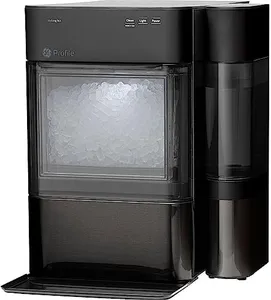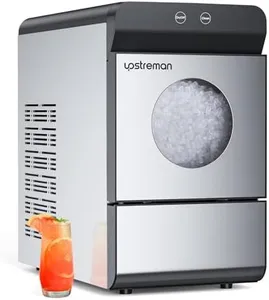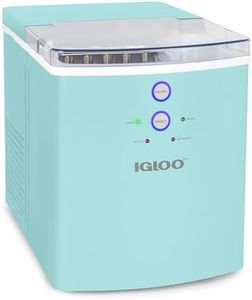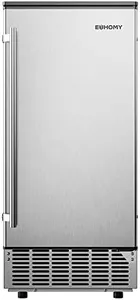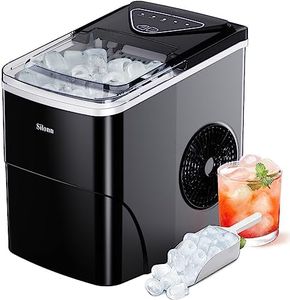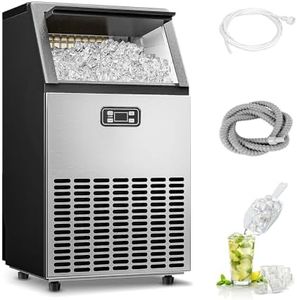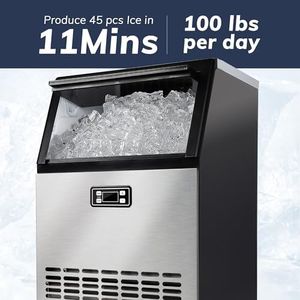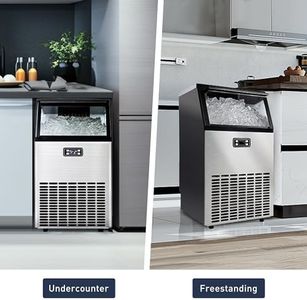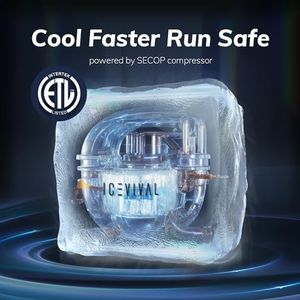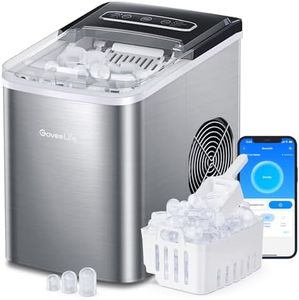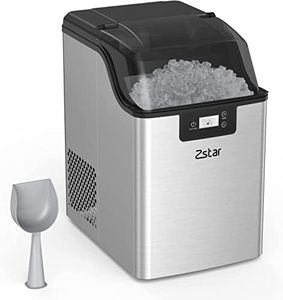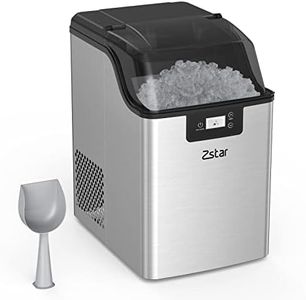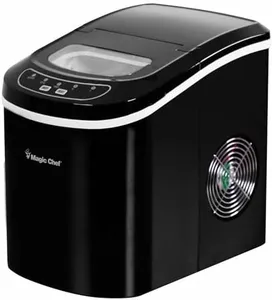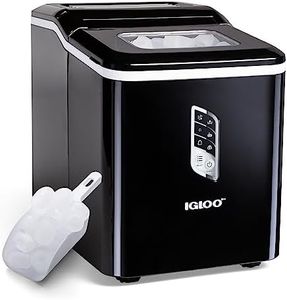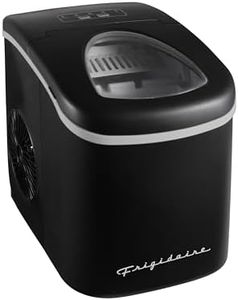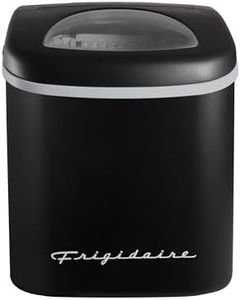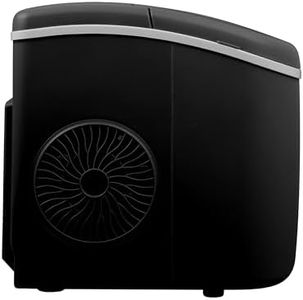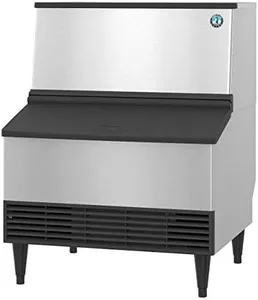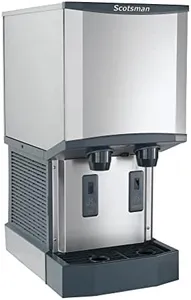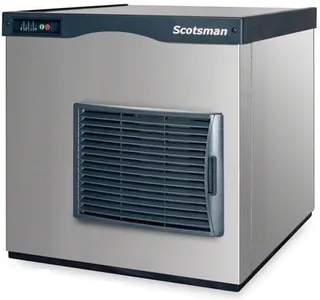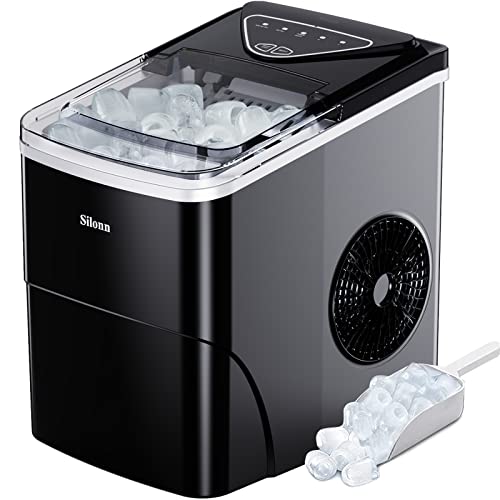We Use CookiesWe use cookies to enhance the security, performance,
functionality and for analytical and promotional activities. By continuing to browse this site you
are agreeing to our privacy policy
10 Best 24 Ice Makers 2025 in the United States
#1
Winner
GE Profile Opal 2.0 with 0.75 Gallon Tank, Chewable Crunchable Countertop Nugget Ice Maker, Scoop included, 38 lbs in 24 hours, Pellet Ice Machine with WiFi & Smart Connected, Black Stainless Steel
The GE Profile Opal 2.0 is an impressive countertop nugget ice maker, producing chewable and crunchable ice that many find more enjoyable than traditional hard cubes. With a remarkable production capacity of 38 pounds of ice per day, you can start enjoying your first batch in just 10 minutes. The removable drawer holds up to 3 pounds of ice, ensuring you have enough on hand for your needs.
Rating
9.9
Chosen by1,153
Ice Type
Size and Installation
Ease of Use and Maintenance
Most important from
4182 reviews
Top 10 Best 24 Ice Makers 2025 in the United States
#1
Winner
9.9 score
GE Profile Opal 2.0 with 0.75 Gallon Tank, Chewable Crunchable Countertop Nugget Ice Maker, Scoop included, 38 lbs in 24 hours, Pellet Ice Machine with WiFi & Smart Connected, Black Stainless Steel
GE Profile Opal 2.0 with 0.75 Gallon Tank, Chewable Crunchable Countertop Nugget Ice Maker, Scoop included, 38 lbs in 24 hours, Pellet Ice Machine with WiFi & Smart Connected, Black Stainless Steel
Ice Production Capacity: 38 pounds per day
Ice Storage Capacity: 3 pounds
Ice Type: Nugget
Size and Installation: 17.5"D x 13.43"W x 16.5"H
Energy Efficiency: Enhanced by water tank
Ease of Use and Maintenance: WiFi, Voice Control, LED Display
Noise Level: Relatively quiet, slightly noisy
Chosen by 1153 this week
Hoshizaki KM-301BAJ 30-Inch Air-Cooled Modular Crescent Cube Ice Machine Maker with 100 lb. Storage Capacity, 290 lbs/Day, 115v, NSF
Hoshizaki KM-301BAJ 30-Inch Air-Cooled Modular Crescent Cube Ice Machine Maker with 100 lb. Storage Capacity, 290 lbs/Day, 115v, NSF
Ice Production Capacity: 290 pounds per day
Ice Storage Capacity: 100 pounds
Ice Type: crescent-shaped cubes
Size and Installation: 28 x 30 x 39 inches
Scotsman Commercial Nugget ice Maker, Ice and Water Dispenser with Storage (HID312A-1) 260 pounds per Day
Scotsman Commercial Nugget ice Maker, Ice and Water Dispenser with Storage (HID312A-1) 260 pounds per Day
Ice Production Capacity: 260 pounds in 24 hours
Ice Type: nugget
Size and Installation: 24.38"D x 16.25"W x 35"H
Energy Efficiency: air-cooled, R-134a refrigerant
Ease of Use and Maintenance: touch-free dispensing, removable dust cover
Noise Level: more noise than water-cooled alternatives
#10
8.2 score
Scotsman N0622A-1 Prodigy Plus Nugget-Style Ice Maker, Stainless Steel, 115-Volts, NSF
Scotsman N0622A-1 Prodigy Plus Nugget-Style Ice Maker, Stainless Steel, 115-Volts, NSF
Ice Production Capacity: 643 pounds per day
Ice Type: Nugget-style
Size and Installation: 22 x 24 x 23 inches
Energy Efficiency: Auto Alert, Smart-Board, Vari-Smart
Ease of Use and Maintenance: Removable panels, reusable filter
Noise Level: Relatively quiet
How do we rank products for you?
Our technology thoroughly searches through the online shopping world, reviewing hundreds of sites. We then process and analyze this information, updating in real-time to bring you the latest top-rated products. This way, you always get the best and most current options available.

Buying Guide for the Best 24 Ice Makers
Choosing the right ice maker can significantly enhance your kitchen experience, whether you need it for home use, parties, or a small business. The key to finding the best ice maker for you is understanding your specific needs and how different features and specifications can meet those needs. Here are some important factors to consider when selecting an ice maker.Ice Production CapacityIce production capacity refers to the amount of ice an ice maker can produce in a 24-hour period. This is important because it determines how much ice you will have available for your needs. Ice makers typically range from producing 20 pounds to over 100 pounds of ice per day. For home use or small gatherings, a machine with a lower capacity (20-50 pounds) is usually sufficient. For larger parties or small businesses, you might need a machine that produces 50-100 pounds or more per day. Consider your typical usage and choose a capacity that ensures you won't run out of ice.
Ice Storage CapacityIce storage capacity is the amount of ice the machine can hold at one time. This is crucial because it affects how often you need to empty the ice bin. Storage capacities can range from a few pounds to over 30 pounds. If you use ice sporadically throughout the day, a smaller storage capacity might be fine. However, if you need a constant supply of ice, a larger storage capacity will be more convenient, reducing the frequency of refills.
Ice TypeIce makers can produce different types of ice, such as cubes, nuggets, or flakes. The type of ice is important depending on your intended use. Cubes are great for general use and cooling drinks, nuggets are chewable and preferred for beverages, and flakes are ideal for food presentation and medical uses. Think about how you plan to use the ice and choose a machine that produces the type of ice that best suits your needs.
Size and InstallationThe size and installation requirements of an ice maker are important to consider, especially if you have limited space. Ice makers come in various sizes, from compact countertop models to larger under-counter units. Measure the space where you plan to install the ice maker and ensure it fits comfortably. Also, consider whether you need a portable model or a built-in unit that requires a water line connection.
Energy EfficiencyEnergy efficiency refers to how much electricity the ice maker uses to produce ice. This is important for both environmental and cost reasons. Look for ice makers with an Energy Star rating or other energy-efficient certifications. These models use less electricity, which can save you money on your utility bills and reduce your environmental footprint. If you plan to use the ice maker frequently, energy efficiency should be a key consideration.
Ease of Use and MaintenanceEase of use and maintenance are important factors to consider for convenience and longevity of the ice maker. Look for features like intuitive controls, self-cleaning functions, and easy access to the ice bin. Regular maintenance, such as cleaning and descaling, is necessary to keep the machine running smoothly. Choose a model that offers straightforward maintenance procedures and clear instructions to ensure hassle-free operation.
Noise LevelThe noise level of an ice maker can be a significant factor, especially if you plan to use it in a quiet environment like a home or office. Some ice makers can be quite loud during operation, which might be disruptive. Check the noise level specifications or look for user reviews that mention noise. If noise is a concern, opt for a model known for quieter operation to ensure it doesn't interfere with your daily activities.
